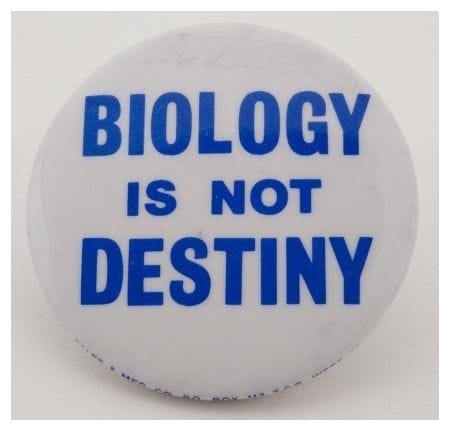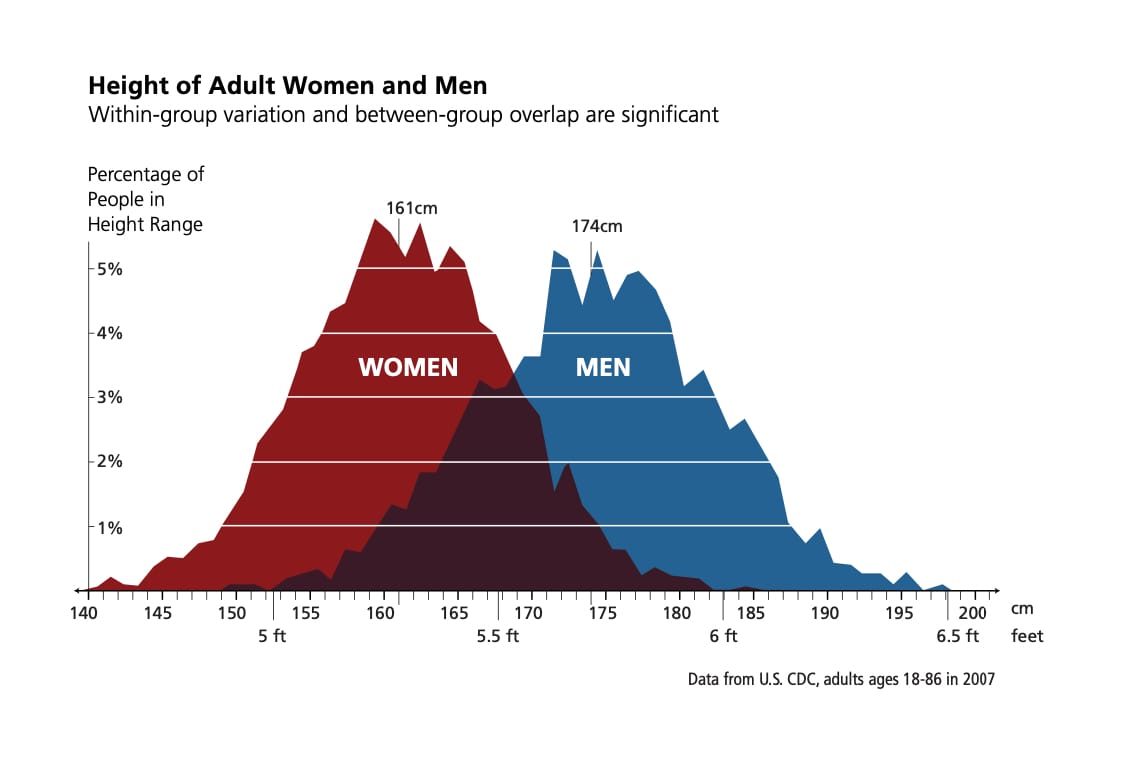Why do I say "Abolish Sex"

The purpose of this new blog is to expand on my previous feminist writing over on Medium and lay out what I hope will be a workable set of principles which articulate a feminist perspective on trans people's political condition and also what it is that we need to change. When I say a feminist perspective, I mean that I will not be arguing a gender "neutral" perspective here, but one that recognises that gender is broadly speaking a system of violence that gives rise to the conditions that trans people find them. Seeking to abolish these conditions, I intend to give a gender and sex abolitionist perspective.
What's wrong with sex?
Sex, the concept of "biological sex" itself rather than the fact of reproduction, functions on the presumption that there are two reproductive types of human body and that one is inferior to the other. Don't believe me? The most recent Supreme Court ruling on the meaning of sex for discrimination purposes describes the distinct groups
with their shared biology leading to shared disadvantage and discrimination faced by them as a distinct group.
But biology, in the conventional sense of describing the ways that organic bodies function, sustain themselves and reproduce in nature, rather than prescribing categories onto bodies for ideological reasons, does not recognise these "distinct" types nor an inherent disposition towards discrimination that flows from the body's matter. As to the question of discrimination, it has been the key objection of the feminist movement for the last century or more that women's biology does not ordain women for oppression (as shown in the badge shown at the top of this essay). To this date, no convincing argument as to why a uterus or breasts means one should be inherently disposed to second class citizenship has emerged. As to the science of sexual distinction, for decades there has been a growing scientific consensus that the category of sex is of some use for understanding reproduction generally, but which in drawing broad brush strokes fails to capture nature's diversity.
For instance, what does the study of sex differences tell us about women? One thing it tells us is that women tend to be shorter than men. This could be considered as it seems to be by the judges of the United Kingdom supreme court to be an inherent disadvantage, but in terms of, say, a gymnast or a figure skater, having less mass means more agility and is a strict advantage. But in their "shared", "distinct" biology, are women smaller than men?

While women share an average probability of being smaller than men, it turns out that this extremely biological characteristic (in terms of relating to the matter and function of the body) is neither shared by women, nor does their height as a characteristic distinguish women from men who may be the same height or smaller than any given woman.
Rather, where "height" functions to discriminate broadly against women and is used to disadvantage women, it is because women are relegated in society. When car manufacturers test seatbelts and do not consider the span of female heights as well as male heights as relevant they discriminate by putting women at risk, not because of the inherent disadvantages of being smaller. Rather, by designing vehicles only to suit taller individuals they design them to be dangerous to smaller individuals and therefore negatively affect most women. It is lack of concern for the diversity of bodies and the sexed reasoning for that lack of concern that is the problem, not the bodies themselves.
But if height is not a distinct factor are there other factors that can be used to distinguish the sexes for the purpose of policy?
I argue here that we have already seen that this idea of sex "distinction" itself, of sexes being at odds with each other puts us at odds with understanding discrimination from a sexual diversity lens. If we can only understand "sex" in terms of absolute and universal separation between types of reproductive body we are insisting on excluding the understanding that many real world bodies do not reproduce.
Trans bodies are imposed on by the sex distinction
For the purposes of trans people this idea of sex distinction moves from the merely problematic nature of the real world overlap between men and women on many physical characteristics, into outright absurdity.
A view of the world that says, as the Supreme Court ruling says in paragraph 7, that biological sex is immutable, or as they put it:
We also use the expression “biological sex” which is used widely, including in the judgments of the Court of Session, to describe the sex of a person at birth
We have to therefore contend with the fact that this is in direct contradiction to the reality that biological bodies are dynamic bodies. In truth the Supreme Court while it was at pains to say that it was not wading into wider debates chose to talk about biological sex in a way that means it can not be changed, and it had to make that choice in order to come to the conclusions it pre-ordained when it refused to allow trans people to argue our case.
Biology, as a dynamic process, and as a field of scientific study however, does not recognise any such "immutability" of bodies. We aren't carved out of some mythical metal only forged by the gods. We are soft. Biology is the study of bodies in change. We are born. We mature. We are injured. We encounter and resist disease. We become disabled in ways that our bodies carry the scars into our future. We age. We die. We decay. The entire concept of "biological sex" as an immutable thing, formed out of this pre existing insistence on the distinction and the categorical difference of sex is an ideology being pressed on to bodies and most of all it is being pressed ideologically on to the bodies of those of us who change our sex characteristics.
The sex distinction is a border that trans people have been crossing by any means available for as early as we developed the means to do so. There is nothing in biology that indicates that we can not. In fact it is through understanding biology that we take hormones to modify these secondary sexual characteristics. We modify the quality of our voices, our fat distributions, the distribution of our facial and body hair. We remove sex organs, we surgically reconstruct different sex organs. We undergo transformations to reform our bodies into bodies we are comfortable with. None of this happens all at once. We are not infinitely malleable. Trans people know there is no sex distinction because trans people know there is no magical crossing over period where after enough HRT and surgery we are metaphysically ordained to be a different sex. Rather this process demonstrates for us the imaginary nature of this immutable wall between the sexes. We are able to modify our sex characteristics within the limits of biology itself and the techniques we have to change it. But we do modify them.
Though insisting (against the facts of our bodies) that we do not change sex is not the limit of anti trans discrimination it is at least in part in response to these changes to our bodies that we are oppressed. A trans woman who had grown breasts was arrested for indecent exposure when she went topless and then thrown into men's prisons in the United States. Was this not because of her sex? Of course it was! The standards in society that say breasts are inherently sexual determined her to be a woman, but the standard that a trans woman's sex is immutably fixed at birth said she was a man. Thus, in one of the classic cases of transmisogyny, she was placed in a facility where it is known, because of her female sex characteristics she would be at risk of sexual violence, while her placement was justified on the basis that she was a "man". This status of "manhood", and the immutability of her supposed inherent sexual advantages here only served to justify the precise sort of violence which is organised against women to be extraordinarily permissible against her because she was trans.
The sex distinction cuts across trans bodies. It puts us in dilemmas where all of the risk and the costs of our feminised sexual differences is placed on us and the remedies for discrimination targeting feminised sexual differences is denied to us. While the contradiction is glaringly obvious enough anyone could understand it without much thought, the costs of resolving this contradiction are pushed into the violence meted out to the trans person.
This brings me back to the fact that sex discrimination is not a neutral force in the world. Women's bodies are stigmatised. Female anatomy and female sexual characteristics are traded in pornography and used for the entertainment for others in a way that does not recognise women's ownership of our own bodies for ourselves. Men can go around shirtless without being sexualised. Women can often not go out in public without their bodies being commented on and being targeted by sexual harassment. For trans women and anyone else with feminised sexual characteristics this continues to be the case. Trans men suffer particularly hostile treatment around gynecology and around becoming birthing parents. The sexual penetrability of both trans men and trans women is seen as a legitimisation of sexual violence. Trans women's penises, unlike men's penises, are widely fetishised and turned into a basis on which we are harassed by "tranny chasers". The man's penis exists for his pleasure. The trans woman's penis exists for her partner's objectification.
All of these experiences are intimately tied up in our biology and in our collections and mixtures and variations of sex characteristics, but none of these experiences can be reduced to or explained by a model of sex which insists on immutability or distinction between sexes, or on the claim that any particular body part causes an inherent disadvantage somehow separate from the social context our bodies are being interpreted by others.
Trans people's bodies are among the bodies that enforcing immutability and difference makes illegal to acknowledge or cater to the existence of.
Legal lesbians
This absurdity goes beyond the simple physical matters too, to the point of speaking over how sexual minorities choose to organise our own spaces. A lesbian night club that permits trans women like lesbian night clubs have since at least when Roz Kaveney featured in the documentary "Rebel Dykes" about the 1980s lesbian feminist punk scene, according to the Supreme Court ruling yesterday, becomes no longer a space for lesbians, because the supreme court says Roz Kaveney is a man. This puts lesbian spaces at risk from claims by people who are actually men saying "you let one man in but not another". The lesbian night club organiser who created a space that was inclusive for trans women is thus denied the right to do so on the basis of the ideology that trans women must be men. Members of the dominant sexual class can insist that even though they don't consider themselves to be women, the fact that the law does not consider trans women to be women is enough to impose on lesbian autonomy in defining these spaces.
Alternatively it creates the risk that lesbians knowing Roz Kaveney is a woman have to say "sorry Roz, the law says we can't have a lesbian space any other way", pushing a member of a marginalised sexual minority out to please members of the Supreme Court of the United Kingdom with the consistency of this exclusion. This is appalling over reach into the lives and organised spaces of sexual minorities but that is what is being pushed by this insistence on an unrelenting and unnuanced idea of immutable sexual difference.
What could we do instead?
This model of sex as fixed and binary and sociologically neutral is not necessary. We have understood for many years that, for instance, race is not a biological reality, but a social one with biological/phenotypical traits that can be targeted for discrimination, but which are not themselves a coherent biological category. And yet we still understand that racial discrimination exists and that we need protections against this. We understand that disability discrimination is often targeting physiological characteristics but that there is no shared disabled body or shared biological trait necessary for disability discrimination to be addressed as a problem to be regulated against in society.
There is absolutely no need for sex to be considered special in this regard. There is no reason why sex is established to be immutable and distinct (against all the evidence that aspects of it can and do change). In fact we know that many times women are victimised not just based on their sex characteristics being part of a female norm but because the way they deviate from the stereotype of their sex, such as in the case of tall or muscular women who are targeted for bullying or hostility for being a woman who does not fit the "distinct" sexual difference expected of women. Enforcing the sex distinction on women in this manner is itself one of the most common forms of sexist abuse in the world. The insistence that women must stay in their box is the key demand of patriarchal sexist society.
Put simply: we need to abolish sex. We need to abolish the ideological, social and environmental barriers which attempt to govern and limit the diversity of sex in the real world.
We need a model of sex discrimination that is focused on eliminating sexual violence, discrimination and hostility targeting sex characteristics. In many parts of the global human rights sphere the language of "Gender Identity, Expression, and Sexual Characteristics" has come into use to encompass the combined population affected by being pushed to the margins of the sex dichotomy. We can improve things also by speaking to the needs of those who have "variations of sex characteristics" commonly known as intersex people (who this "sex distinction" also cuts through the lives of). We need space for non-binary people, whether they modify their sexual characteristics or not to be allowed to exist, to self-determine their genders. We need space for people who are exploring their gender identity and are currently indeterminate to not be immediately punished by society the moment they ask the question "I wonder if this outfit, this space, this gender community is right for me".
"Biological sex", so far as we have to specify the "biological" almost exclusively is used to to try and distinguish our understanding of "sex" from "social", "legal" or other interpretations of sex as a sort of physiological and immutable distinct state. But in doing so it demonstrates the way that "biological sex" doesn't actually care about biology the science. Your average biology textbook will just call it "sex" and start describing different organs and how they function in relation to each other. The "biological" in "biological sex" serves to hide away from describing the specifics of how our bodies interact with the social and political world, to instead act as an institutional force to determine what our bodies are allowed to be and do. It also serves to determine which bodies are considered "proper" and subject to protection of the law, and which bodies are to be subject to additional risks.
I repeat myself: We need to abolish the institution of biological sex, for the sake of biological humanity in ALL our differences.


